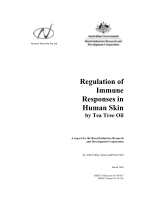Regulation of Immune responses in Human Skin by Tea Tree Oil
This report is presented by a research group which has previously established, in laboratory experiments, that tea tree oil can regulate the inflammation-related activities of...

33 pages
Published: 1 Mar 2004
Author(s): Finlay-Jones, John, Hart, Prue
Download report PDF
DownloadPurchase a hard copy - AUD $45.00
This report is presented by a research group which has previously established, in laboratory experiments, that tea tree oil can regulate the inflammation-related activities of human white blood cells. Further, they studied tea tree oil in inflammatory responses in an animal model. It limited several types of inflammation, with the timing of its application being an important factor in obtaining a significant outcome. Typically, application was most effective if made close to the time of onset of the inflammation.
The focus of this study shifts to humans. Tea tree oil was found to regulate the inflammatory response in humans given a small injection of histamine into skin (perhaps mimicking an insect bite). In a separate study, in humans who show skin sensitivity reactions to nickel, tea tree oil was found to lessen the sensitivity response, most noticeably in a subset of individuals. In summary, this report provides further evidence that tea tree oil has potential as an anti-inflammatory agent in humans. A remaining challenge is to determine why not all nickel-sensitive people respond well to tea tree oil.